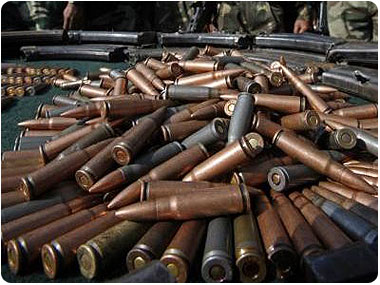They demand exports to all parties in the conflict are suspended
Spanish arms transfers during the first semester of 2014
Report in Spanish ‘Secretos que matan’
The data on arms licenses and exports published in March this year by the Spanish government do not allow to know whether the Saudi-led coalition has used the Spanish ammunition, bombs, torpedoes and missiles or aircraft exported both in 2014 or in previous years in the airstrikes in Yemen since March. This is one of the key findings of the report ¿Secretos que matan? (Killing Secrets?) made public today by Amnesty International, Greenpeace, FundiPau and Oxfam Intermón, which sets out recommendations to strengthen parliamentary control and transparency to ensure Spain complies with the legal principle of «No licensing of arms for atrocities”.
“We have documented several strikes in five densely populated areas, as a result of which at least 139 people, including at least 97 civilians (33 of whom were children) were killed, and 460 individuals were injured, including at least 157 civilians”, notes Esteban Beltrán, Director of Amnesty International Spain, who claims that “Several of these strikes destroyed or damaged civilian infrastructure in what appear to have been indiscriminate attacks, which violate international humanitarian law”. All sides in the conflict appear to have committed serious abuses and human rights violations.
“The Spanish government must investigate whether the Saudi Arabia-led coalition has used Spanish arms in these airstrikes and suspend arms transfers to all sides in the conflict in Yemen which could be used to commit atrocities”, demands Jordi Armadans, Director of FundiPau. Under international humanitarian law applicable to the armed conflict in Yemen, civilians and civilian objects may never be deliberate targets of attack and the prohibition of attacks that fail to discriminate between civilians and combatants or that cause civilian harm disproportionate to the expected military gain of an attack must be respected. According to the UN more than 550 civilians have been killed including more than 100 children since the military campaign began on 25 March.
“Yemen is facing a serious humanitarian crisis”, says José María Vera, Director of Oxfam Intermón, who adds that “There are over 150,000 internally displaced people and there is a serious shortage of fuel, medicines and food. The humanitarian situation before the outbreak of violence was already critical, with 60% of the population depending on aid and 90% of the food being imported. This crisis further intensifies the extreme situation people in Yemen live under”.
“It is time for the government to stop considering secret the minutes of the Interministerial Board responsible for arms exports and to revoke that decision taken in 1987”, says Mario Rodríguez, Director of Greenpeace Spain, who notes that “Since we started campaigning for transparency in the Spanish arms trade 20 years ago, there has been significant progress, but the current degree of transparency of the government’s report prevents Parliament and civil society from knowing who is using which specific type of arms exported by Spain”.
According to the NGO report, in the first semester of 2014, the Spanish government authorised arms exports were worth over 1,445 million Euros and Spanish arms exports were worth over 1,447 million Euros.
The NGOs welcome the government’s detailed report referred to Congress, including details of some of the operations and describing the type of product exported or authorised. They highlight the application by the government of the preventive approach in some cases, including the refusals of four military transport planes to South Sudan, tear gas canisters for the police in Egypt and hunting cartridges to Guinea Bissau, as well as the suspension of licences of anti-riot equipment and hunting cartridges to Venezuela and the temporary suspension of licenses of hunting and sporting guns to Ukraine.
Over seven years after the enactment of Act 53/2007 regulating the arms trade and in the face of the steady rise of these exports in the past decade, the NGOs urge the government and political parties to take a range of measures to continue making further progress on transparency and parliamentary control to ensure no Spanish arms transfers which may contribute to commit or facilitate serious violations of international human rights law or international humanitarian law are authorised.
The NGO report identifies a series of operations of concern due to the nature of the equipment exported and/or authorised, the recipient and/or the clear risk that it may be used to commit or facilitate serious violations of international human rights law or international humanitarian law. Likewise, it includes other operations on which it is necessary to have further details to be able to have an informed opinion. Concerning the operations of concern, the NGOs call on the Spanish government to:
• Investigate whether the Saudi armed forces have used Spanish arms exported in recent years to commit or facilitate serious violations of international humanitarian law.
• Refrain from licensing exports of arms to Bahrein which in the past 5 years have been largely used against protesters.
• Suspend the transfer to Egypt of arms that could be used in internal repression such as cracking down on protests with excessive and unwarranted force to commit serious human rights violations until the Egyptian authorities carry out a full, prompt and impartial investigation into the violence by the security forces in Egypt over the past several years, and demonstrate that Spanish arms exported will not be used to commit or facilitate serious violations of international human rights or humanitarian law, particularly in Sinai, Yemen and Libya.
• Suspend arms transfers to Israel, Hamas and other Palestinian armed groups until the substantial risk of that material or equipment is used to commit serious violations of international human rights law and international humanitarian law is removed, and to promote the UN Security Council imposes a comprehensive arms embargo on Israel, Hamas and other Palestinian armed groups.



